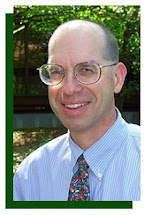I did not see any students in the audience.
YES, there are students interested in conservation. I know there are students of conservation in Missouri. I visited with some outstanding students just last month at the University of Missouri, both in the School of Natural Resources and in the Department of Biological Sciences. On Friday, I waited in the lobby after the meeting was over and saw hundreds of students coming and going from the buildings, especially from the School of Natural Resources building next door.
I visited at the meeting on Friday with Dr. Mark Ryan, Director of the School of Natural Resources.
And within the last month, I met with two new faculty members at the University of Missouri to learn about their research interests and how their work might help fish, forests, and wildlife in Missouri. Dr. Carla Barbieri is working in the area of agri-tourism and Dr. Franciso Aguilar works in the area of forest economics.
YES, Missourians are interested in fish, forests, and wildlife. Surveys, focus groups, and public meetings all have information that shows that Missourians are very interested in the outdoors. The information also indicates they simply don't have time to learn about some things and are not as aware as they'd like to be about the outdoor world.
For specific issues, Missourians are extremely interested. A recent series of surveys and public meetings with Missourians provided over 8,000 comments about proposed changes to deer management regulations.
Nature programs, fishing and hunting programs, public school programs, and volunteer opportunities for adults. The Missouri Department of Conservation has many staff dedicated to producing materials, programs, and support for schools in Missouri, school teachers, and for adults that are interested in the outdoors, nature, and conservation. There are listing of events, places to go, and things to do.
Each one of us can make a difference by telling others about conservation.
Everyone in Missouri can make a difference for both conservation and to help brighten the day of others. Just tell someone else about something interesting you saw today in the outdoors.
- The redbud trees in Missouri have bloomed almost all at once this year and are incredibly purple.
- I told several people yesterday that Wood Duck boxes can mounted with the nest box hole about six feet off the ground when using a cone guard under the box. This makes the box easy to monitor, protects the chicks from being eaten, and the ducks still like it.
- I can tell you that conservation efforts in Missouri have an over $10 billion dollar economic impact, and that just counts the direct recreation spending and forest products industry. There are billions of dollars of economic benefits that we each receive each day from clean water, a healthy environment to live and work in, and the products we use.
Take action. Conservation improvements happen because people take action, even if it's learning one new thing about fish, forests, and wildlife. It can happen in your own home or backyard.
You can learn about conservation without going to a meeting. I always learn something new when I attend a meeting of the Conservation Commission. But you don't have to go a meeting to learn something new. Check out the Department's Web pages or look outside!


No comments:
Post a Comment